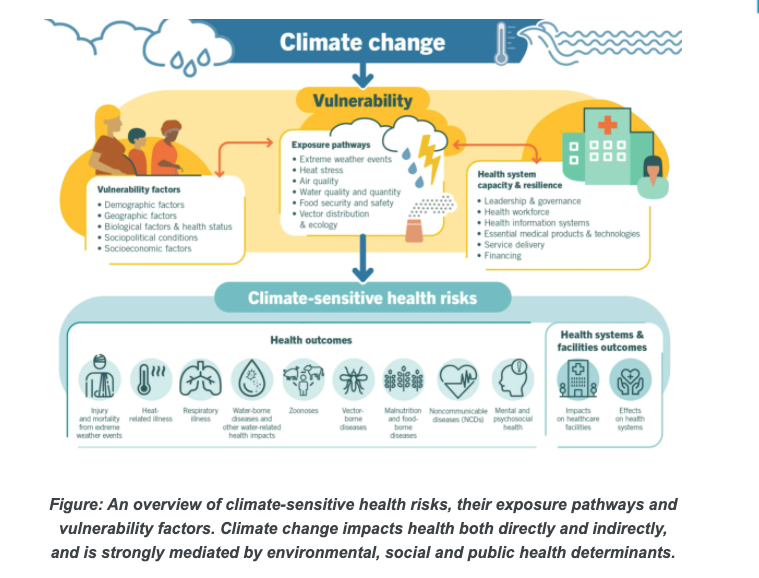Medical schools and climate change
With Biden’s promise to half the United States’ greenhouse gas pollution from its peak by 2030 it is timely to discuss climate change and its role in health - and in the medical school curriculum.
The World Health Organization (WHO) has declared climate change the greatest threat to human health in the 21st century and the Lancet Countdown on Health and Climate Change warned that climate will soon define the health of people at every stage of their lives. It is not just health affected by climate change - but also the infrastructure, supply chain, health inequities, and issues of public health & safety. .
A 2018 commissioned report of the Accreditation Council for Graduate Medical Education (ACGME) identified “climate-change medicine” as an emerging internal medicine subspecialty by 2035. The American Medical Association (AMA) echoed this position with a June 2019 policy resolution to support “climate change education across the medical education continuum,” starting with undergraduate training. Less than a month later, the United Nations declared a “climate emergency,” and in partnership with over 7000 institutions across 6 continents, committed to strengthening climate change education.
In January 2019, the NEJM published “The Imperative for Climate Action to Protect Health” and in August 2019, the New England Journal of Medicine launched an online “Climate Crisis and Health” hub to help “mobilize the urgent, large-scale climate action required to protect health.” However, In the United States, “climate change” remains absent from the Association of American Medical College’s (AAMC’s) Curriculum Inventory topic list of required and elective courses, although they did publish an article regarding climate change in the curriculum for AAMC news. The AAFP has formed a Medical Society Consortium on Climate and Health to raise awareness and partnered with 20 other medical organizations and associations representing 500,000 health care professionals. The Global Consortium on Climate and Health Education, was launched at Columbia University in 2017, and already counts 20 U.S. medical schools among its 188-member roster.
Major Health Risks Associated with Climate Change. Haines A and Ebi K. The Imperative for Climate Action to Protect Health. N Engl J Med 2019; 380: 263-273.
Anytime a new issue arises it is challenging for medical schools to integrate it into their curricula due to competing demands from traditional biomedical curricula, particularly at a time when medical schools are aiming to decrease overall classroom time. A survey conducted in 2020, that included 600 students at 12 medical schools, published in the Journal of Climate Change and Health indicated that the majority of medical students believe that climate change should be a core topic in medical school curricula. Medical students across several schools have established Medical Students for a Sustainable Future, a network of students who recognize climate change as an urgent threat to health and social justice. They have published a guide to Climate & Health Curriculum Reform in Medical Schools. which includes sample syllabi and proposals for integrating climate into the curriculum. They host monthly curriculm meetings to discuss climate and curriculum efforts and have local chapters at 31 medical schools. A publication in Perspectives in Medical Education in 2019, A call for action: integrating climate change into the medical school curriculum, reported that one-third of US medical schools plan to implement curricula changes in the near future while 31% are in the process. One fifth have already implemented changes within the past three years. The COVID-19 pandemic has increased the pressure on medical schools to incorporate these learning objectives into the curriculum.
Some medical schools have begun to incorporate climate change and health into their curricula, although based ion a 2019 Scientific American survey only 16% of medical schools include information about climate change in their courses. There are a variety of publications that include curricular frameworks for linking climate and health learning objectives both for medical school and residency training.
There are a variety of models for integration of content, the most common format is to integrate content into existing curricular activities, such as the curriculum illustrated at the Cleveland Clinic Lerner College of Medicine at Case Western Reserve University. (Sullivan JK Lowe KE, et. al). Other models inlcude offering a separate elective, track, or Master’s degree for students who demonstrate interest. These, of course, are elective and students who have limited knowledge in the area may choose not to participate - deemphasizing the content. Many programs come from a larger initiative out of the associated School of Public Health or the local health departments opening opportunities and resources for students to advocate for inclusion of content in the medical school. Many of these curricular changes have been primarily motivated and led by students.
Some of the evolving or existing programs include the following:
At Icahn School of Medicine at Mount Sinai, a student led initiative led to the development of content on climate -related health content in first and second year courses.
UMass Chan Medical School has integrated climate change into lectures, small group cases, and assignments across the curriculum.
Medical students at Emory University School of Medicine have taken the initiative and proposed a “Climate Change & Environmental Health” curriculum for the pre-clinical years, and are working to implement the proposal for its graduating class of 2024. (Rabin BM, Lane EB, and Philipsborn RP, 2020). Similar to Case Western, their curricular development is focused on identifying topics of pathophysiology and disease linked to climate change in the first and second-year curricula. They have published their structure and learning objectives.
The Hackensack Meridian School of Medicine integrated environmental health knowledge and skills into their first year curriculum via a two hour interactive large group learning module and follow up activities.
At Stanford, where there is infrastructure for the climate and health conversation with the Stanford Climate and Health group, medical students launched a climate change and health elective in 2020 that contains a series of lunch seminars featuring experts on climate change.
A student group at Tulane University School of Medicine recently had a course approved that was first offered in 2020.
Student initiative at the Virginia Commonwealth School of Medicine in Richmond led to the integration of climate effects into preclinical coursework and they are in the proces of developing a 4th year elective.
The University of Colorado Anschutz Medical School recently inaugurated its new 4-year branch campus in Fort Collins, CO in partnership with Colorado State University in 2020. Colorado State University has a One Health Institute which takes a transdisciplinary approach to advance health for humans, animals, and the environment and a school of veterinary medicine allowing for interdisciplinary collaboration. One Health and Society is a pillar of the new curriculum and includes instruction in population health, ethics, communication, issues around social justice and social determinants of health, and other non clinical topics important to the practice of medicine. The focus is not solely on climate change but on the interaction between humans, animals, and the environment. One Health is offered as a first-year elective. At the main campus a new elective, Climate Medicine, was offered by the section chief of wilderness and environmental medicine, and there is also a fellowship in Climate and Health Science Policy at the school.
Harvard in conjunction with the Harvard T.H. Chan School for Public Health Center for Climate, Health, and the Global Environment (C-CHANGE), launched Climate MD, a program that focuses on the healthcare effects of climate change to prepare a climate-ready workforce. The activities of the program include publishing in major medical journals, preparing medical leaders on climate and health, working with community health clinics, changing the national media narrative, and communicating directly with patients. The Harvard Global Health Institute has launched a massive open online course on the Health Effects of Climate Change through EDx. They have outlined a residency curriculum and hosted a Climate Change and Health Fellow.
The University of Illinois Chicago School of Public Health has a project Building Resilience Against Climate Effects (BRACE Illinois). It is funded by the CDC to build the capacity of Illinois’ public health system to minimize the impact of climate change. The Internal Medicine Clerskhip at University of Illinois at Urbana integrated a standardized patient case enhanced with details and risks due to climate change, they have uploaded their case to MedEdPORTAL, an AAMC curriculum portal.
University of Washington Medical school has a Center for Health and the Global Environment offers a graduate certificate in climate change and health to any University of Washington graduate student which includes coursework and a capstone project.
The University of Florida has the first of its kind Master of Science in One Health which offers transdisciplinary coursework and mentorship to cultivate a systems thinking approach incorporating public, environmental and veterinary disciplines. There is also an option for a 12 credit certificate program. Read this blog post written by a current medical student at The University of Florida about how they plan to integrate the One Health ideal into their future practice of medicine. Through the One Health Center of Excellence there is a Circular Health Fellowship to fund 3-5 month interdisciplinary projects around issues of the COVID 19 pandemic. Although the One Health is not integrated into the medical school curriculum there is probably opportunities through the Discovery Pathways Program to do collaborative research within the institute or pursue the masters program.
At UCSF, Dr. Sheri Weiser, a Professor of Medicine at the Division of HIV, Infectious Diseases and Global Medicine at Zuckerberg San Francisco General Hospital at UCSF, has been creating sustainability curricula throughout the many programs, primarily in the form of faculty training and lecture series. The UCSF Center for Climate, Health and Equity is focused on building a network of faculty champions. The climate and health course has been required of first year students since 2009 and explores concepts of environmental justice.
If you want to learn more about climate change and health you can take these free Online courses:
If you are interested in a perspective on a clinical case affected by climate change this article in the New England Journal of Medicine eloquently details the impact of the environment on a case of asthma in a young girl.
Harvard Health Effects of Climate Change through EDx
Yale Climate Change and Health: From Science to Action through Coursera
Climate and Health Responder Course for Health Professionals, an 8 week free online certificate course to give health professionals the tools to effectively respond to the climate and health crisis in their local communities.
IPCC climate Change and Health Program, a self paced, interactive online course.
The CARE Climate and Resilience Academy
Recorded course on The Health Emergency of Climate Change by University of California
Are you a health professional looking to create change? There are several fellowships in climate change and health:
The 2022 Public Voices Fellowship on the Climate Crisis, a one year fellowship
Cambridge Health Alliance Fellow Program at the Center for Health Equity Education and Advocacy
University of Colorado Anschutz Medical Campus Physician Fellowship in Climate Medicine


